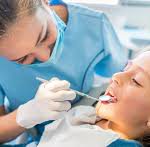While reviewing some recently published research reports, I was interested to see that several studies in PubMed™ have confirmed what we have been seeing in clinical practice. Dental professionals need to be particularly diligent about getting proper chiropractic care.
The issue seems to stem from lots of unilateral activities while working with patients and equipment placing unnatural stresses on the clinician’s spinal column, especially in the upper part of the neck.  One study involving sixty patients demonstrated that dentist’s necks were the most common site recording abnormal findings (72%). Chiropractors have long known that such repetitive activities in positions like those in which we find these professionals and paraprofessionals engaged can result in vertebral subluxations. When vertebrae become misaligned they can insult the nerve system and distort the vital communications between the brain and body parts. Ultimately that results in disturbed function, vulnerability in various body systems, and reduced overall performance.
One study involving sixty patients demonstrated that dentist’s necks were the most common site recording abnormal findings (72%). Chiropractors have long known that such repetitive activities in positions like those in which we find these professionals and paraprofessionals engaged can result in vertebral subluxations. When vertebrae become misaligned they can insult the nerve system and distort the vital communications between the brain and body parts. Ultimately that results in disturbed function, vulnerability in various body systems, and reduced overall performance.
Another recent study was conducted on 204 dentists who work in public health clinics in the northwest of São Paulo, Brazil. A shocking 81.4% of those clinicians were found to have musculoskeletal disorders, especially involving the spinal column.
Adding to the frequently awkward positions that dentists, hygienists and assistants find themselves in, clinical areas and equipment, are often set up so that it is difficult or even impossible to work from both sides of the patient. Poor ergonomics isn’t the only insult to the dental professional’s health and safety. There’s the threat of infection from blood-borne pathogens, and the United States Occupational and Health Administration has cited concerns about exposure to beryllium a metal associated with skin and respiratory difficulties including lung cancer. These problems aren’t new, and it seems to begin as early as the years spent as students in dental training programs.
The high percentage of dental professionals experiencing ongoing spinal insults, and the seriousness of continuous distortion to a person’s nerve supply, underscores just how important it is for these health care workers to maintain a good nerve supply.  Students really ought to receive information about how important it is for them receive chiropractic care, and not just when they are hurting. Perhaps dental education programs should recommend good spinal hygiene for these practitioners, as enthusiastically as they encourage good dental hygiene for their patients.
Students really ought to receive information about how important it is for them receive chiropractic care, and not just when they are hurting. Perhaps dental education programs should recommend good spinal hygiene for these practitioners, as enthusiastically as they encourage good dental hygiene for their patients.
